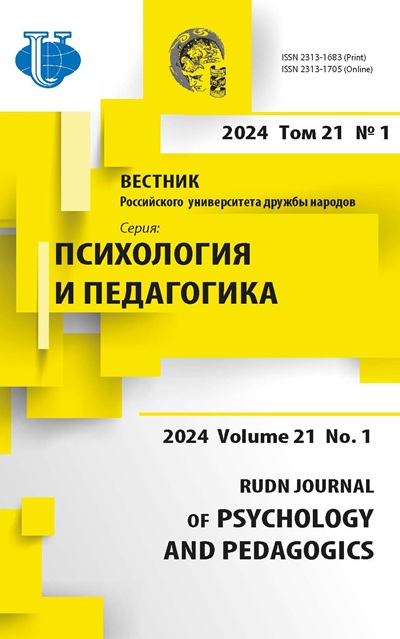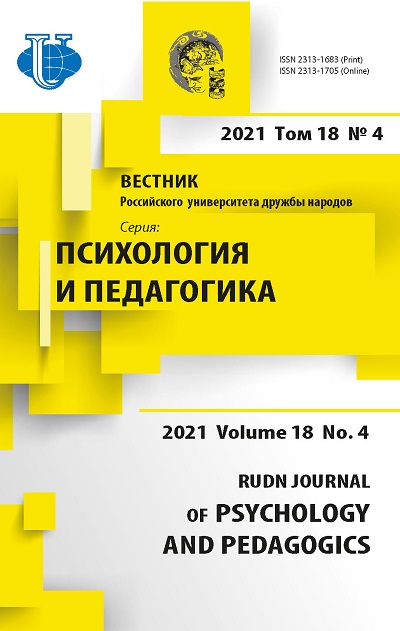Aggressiveness of Participants in Educational Relations and Psychological Safety of School Environment
- Authors: Badiev I.V.1,2
-
Affiliations:
- Buryat Republican Institute of Educational Policy
- Dorzhi Banzarov Buryat State University
- Issue: Vol 18, No 4 (2021)
- Pages: 708-730
- Section: PERSONALITY IN THE MODERN EDUCATIONAL ENVIRONMENT IN RUSSIA AND IN THE WORLD
- URL: https://journals.rudn.ru/psychology-pedagogics/article/view/29898
- DOI: https://doi.org/10.22363/2313-1683-2021-18-4-708-730
Cite item
Full Text
Abstract
The problem of aggression and violence in the educational space is currently quite serious. Illustrative examples of it are numerous publications in the media about acts of aggression exhibited by students against their peers and teachers, about the use of violence by teachers against their students, acute conflicts between the parents of students, sometimes leading to tragic consequences. In this regard, the works devoted to the problem of the psychological safety of the educational environment become very important. The purpose of our research is to identify the factors of psychological safety of the educational environment in the context of the aggressiveness of the participants in educational relations. The study involved 15 292 respondents, including 945 teachers, 6478 parents and 7869 students of grades 7-11 from 34 schools in Ulan-Ude. The following psychodiagnostic techniques were used: Cook - Medley Hostility Scale (CMHS); Questionnaire of Legitimized Aggression by S.N. Enikolopov and N.P. Tsibulsky; Bass - Perry Aggressiveness Questionnaire BPAQ (LA-44) in Russian adaptation by S.N. Enikolopov and N.P. Tsibulsky; questionnaire for students, teachers and parents “Psychological diagnostics of the safety of the educational environment at school” by I.A. Baeva. The empirical data obtained were subjected to correlation and factor analysis. As a result of the study, the following conclusions were formulated: (1) the psychological safety of students is associated with the peculiarities of the relationships between the teachers and students, between the parents of students and the school, between the parents and other students, between the parents and their children in the context of school education; (2) aggressiveness of students is associated with the level of aggression of their teachers and is not closely related to the level of aggression of their parents; (3) there is an inverse relationship between the aggressiveness of students and their sense of security in relationships with their teachers; (4) aggressiveness of teachers is associated with their satisfaction with the school. There are five areas of relationships that need to be taken into account when designing a safe educational environment: (1) the relationship between parents and students at school; (2) the relationships among teachers and accepted rules of conduct at school; (3) the relationships between teachers and students; (4) family satisfaction with school; (5) teachers’ satisfaction with the school.
About the authors
Igor V. Badiev
Buryat Republican Institute of Educational Policy; Dorzhi Banzarov Buryat State University
Author for correspondence.
Email: bad_igor@mail.ru
ORCID iD: 0000-0002-4341-2545
PhD in Psychology, is Associate Professor at Department of Upbringing and Continuing Education of the Buryat Republican Institute of Educational Policy, Senior Lecturer at the Department of Developmental and Educational Psychology, Dorzhi Banzarov Buryat State University, and psychologist at the Center for Diagnostics and Counseling Ulan-Ude
30 Sovetskaya St, Ulan-Ude, 670000, Russian Federation; 24A Smolina St, Ulan-Ude, 670000, Russian FederationReferences
- Baeva, I.A. (2012). Tekhnologii obespecheniya psikhologicheskoy bezopasnosti v sotsialnom vzaimodeistvii kak sostavlyayushchie professionalnoy kompetentnosti vypusknika psikhologo-pedagogicheskogo profilya. Universum: Vestnik Gertsenovskogo Universiteta, (1), 93–106. (In Russ.)
- Baeva, I.A. (2015). Students’ psychological security assistance in the educational environment. Vestnik Chelyabinskogo Gosudarstvennogo Pedagogicheskogo Universiteta, (6), 135–141. (In Russ.)
- Baeva, I.A. (2017). Psychological security of educational environment in the structure of integrated security of educational organization. Каzan Pedagogical Journal, (8), 12–18 (In Russ.)
- Baeva, I.A. (Eds.). (2006). Ensuring psychological safety in an educational institution. Saint Petersburg: Rech Publ. (In Russ.)
- Barefoot, J.C., Dodge, K.A., Peterson, B.L., Dahlstrom, W.G., & Williams, R.B. Jr. (1989) The Cook – Medley hostility scale: Item content and ability to predict survival. Psychosomatic Medicine, 51(1), 46–57.
- Barkanova, O.V. (Eds.). (2009). Methods for diagnosing the emotional sphere: Psychological workshop. Krasnoyarsk: Litera-print. (In Russ.)
- Botova, M.G. (2012). Sootnoshenie ponyatiy “Nasilie” i “Agressiya”: Teoretiko-empiricheskoe issledovanie. Vestnik Kostromskogo Gosudarstvennogo Universiteta, 18(1), 100–102. (In Russ.)
- Enikolopov, S.N., & Tsibulsky, N.P (2008). Izuchenie vzaimosvyazi legitimizatsii nasiliya i sklonnosti k agressivnym formam povedeniya. Psikhologicheskaja Nauka i Obrazovanie, 13(1), 90–98. (In Russ.)
- Enikolopov, S.N., & Tsibulsky, N.P. (2007). Psychometric analysis of Russian-language version of questionnaire for aggression diagnostics by A. Buss and M. Perry. Psikhologicheskii Zhurnal, (1), 115–124. (In Russ.)
- Gorchinskaya, A.A., & Kapelyushnik, R.E. (2020). Ensuring the psychological safety of the educational process in educational institutions of higher education. Bulletin of Chelyabinsk State University. Education and Healthcare, (1), 5–9. (In Russ.)
- Grishina, E.V. (2016). Psikhologicheskaya bezopasnost obrazovatelnoy sredy i antivitalnye perezhivaniya podrostkov. Izvestiya Rossiyskogo Gosudarstvennogo Pedagogicheskogo Universiteta imeni A.I. Gertsena, (182), 97–103 (In Russ.)
- Johnson, C.E., Keating, J.L., & Molloy, E.K. (2020). Psychological safety in feedback: What does it look like and how can educators work with learners to foster it? Medical Education, 54(6), 559–570. https://doi.org/10.1111/medu.14154
- Kholueva, K.A., & Mukharlyamova, A.Yu. (2013). Psikhologicheskaya bezopasnost obrazovatelnoy sredy. Kontsept, (S1), 87–91. (In Russ.)
- Kulikova, T. (2020). Risks and threats to psychological safety of schoolchildren under the conditions of a multicultural educational environment. The Scientific Heritage, (52–2), 52–54. (In Russ.)
- Malieva, Z.C., & Arsoev, A.A. (2020). To the question of the principles of forming psychological security of the school educational space. Problemy Sovremennogo Pedagogicheskogo Obrazovaniya, 66(3), 153–156. (In Russ.)
- Park, J.E., & Kim, J.-H. (2021). Nursing students’ experiences of psychological safety in simulation education: A qualitative study. Nurse Education in Practice, 55, 103163. https://doi.org/10.1016/j.nepr.2021.103163
- Roy, D. (2019). Development and validation of a scale for psychological safety in school among high school students in India. Management and Labour Studies, 44(4), 394–416. https://doi.org/10.1177/0258042X19870330
- Schepers, J., Jong, A. de, Wetzels, M., & Ruyter, K. de. (2008). Psychological safety and social support in groupware adoption: A multi-level assessment in education. Computers & Education, 51(2), 757–775. https://doi.org/10.1016/j.compedu.2007.08.001
- Sheketera, A.A., Vityazeva, Y.A., & Bogomaz, S.A. (2014). Psychological safety as a factor in the intellectual development of school leavers. Procedia – Social and Behavioral Sciences, 154, 225–228. https://doi.org/10.1016/j.sbspro.2014.10.140
- Shumilova, E.A. (2013). Psychological security of the subjects of educational process. Sovremennaya Vysshaya Shkola: Innovatsionnyy Aspekt, (2), 30–33. (In Russ.)
- Smirnova, T.L. (2019). Psychological analysis of implementation of professional’s dangerous and safe behavior. Yaroslavskiy Pedagogicheskiy Vestnik, (3), 150–156. (In Russ.)
- Torralba, K.D., Jose, D., & Byrne, J. (2020). Psychological safety, the hidden curriculum, and ambiguity in medicine. Clinical Rheumatology, 39(3), 667–671. https://doi.org/10.1007/s10067-019-04889-4
- Twisk, D.A.M., Commandeur, J.J.F., Vlakveld, W.P., Shope, J.T., & Kok, G. (2015). Relationships amongst psychological determinants, risk behaviour, and road crashes of young adolescent pedestrians and cyclists: Implications for road safety education programmes. Transportation Research Part F: Traffic Psychology and Behaviour, 30, 45–56. https://doi.org/10.1016/j.trf.2015.01.011
- Verbina, G.G. (2013). Psychological safety of a person. Vestnik Chuvashskogo universiteta, (4), 196–202. (In Russ.)
- Wang, M.-T., Degol, J.L., Amemiya, J., Parr, A., & Guo, J. (2020). Classroom climate and children’s academic and psychological wellbeing: A systematic review and meta-analysis. Developmental Review, 57, 100912. https://doi.org/10.1016/j.dr.2020.100912
- Zelenev, I.A. & Prokhoda, V.A. (2020). Subjective well-being and trust in the context of psychological security in contemporary Russia and other European countries. Monitoring of Public Opinion: Economic and Social Changes, (1), 340–367. (In Russ.) https://doi.org/10.14515/monitoring.2020.1.14
- Zinchenko, Y.P., Dontsov, A.I., Perelygina, E.B., & Zotova, O.Yu, (2019). Psychological safety of a person. Moscow: Yurayt Publ. (In Russ.)
















